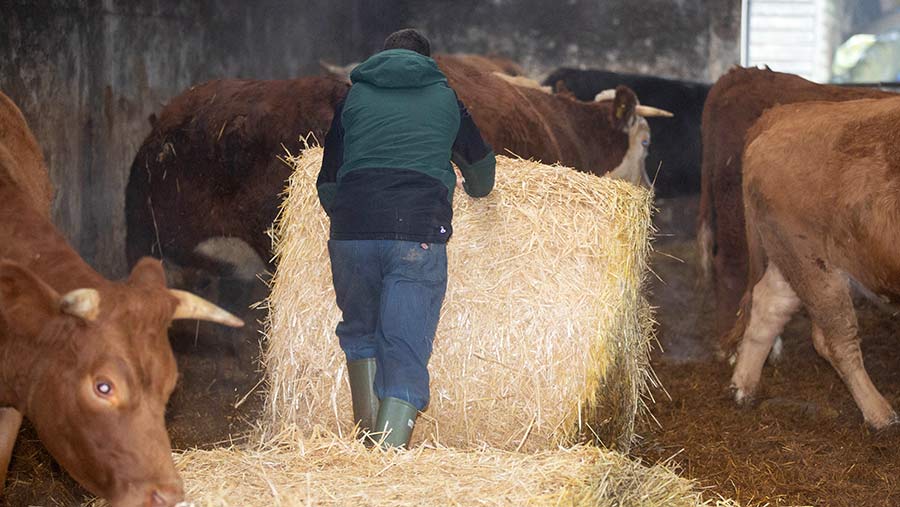Q&A: Changes to farm health and safety investigation fees
 © Tim Scrivener
© Tim Scrivener The hourly fee imposed on businesses for health and safety breaches has risen by almost 20% as of 6 April.
The Health and Safety Executive’s fee for intervention (FFI) has been increased from £129/hour to £154/hour.
The FFI was introduced in 2012 as part of a cost-recovery regime. Businesses are charged for the costs of an investigation from the point that a material breach is identified to the point a decision is made on enforcement action.
See also: Farm health and safety: farm and work vehicles
This is the second time the FFI has increased since it was introduced. It increased from £124/hour to £129/hour in 2016.
According to the HSE’s most recent annual report and accounts, in 2017-18 FFI invoices brought in income of £15.05m against costs of £16.96m, leaving a deficit of about £1.9m.
In 2016-17, £14.93m was brought in by FFI, at a cost of £16.64m.
An HSE spokesman said: “The HSE must set the FFI rate with the aim of recovering its full cost, and in recent years it has operated at a deficit.
“A combination of this and cumulative inflationary pressures support the increased hourly rate.”
Who does the FFI apply to?
- Employers
- Self-employed people who put others at risk
- Public and limited companies
- General, limited and limited-liability partnerships
- Crown and public bodies
When is a fee due?
The Health and Safety and Nuclear (Fees) Regulations 2016 say a fee is payable to the HSE if:
- A person is contravening or has contravened health and safety laws; and
- An inspector is of the opinion that the person is or has done so, and notifies the person in writing of that opinion.
Farmers who do not break the law won’t pay anything.
What is a material breach?
A material breach is something that an inspector considers serious enough that action needs to be taken. If the inspector sends a notification of contravention (NoC) after their visit, a fee will have to be paid.
What is a NoC?
The NoC must include
- The law the inspector considers to have been broken
- The reason/s for this opinion
- Notification that a fee is payable to the HSE
Where an inspector has simply given verbal or written advice, a fee will not need to be paid.
How much money will be due?
The fee is £154/hour, as of 6 April. It will include the costs covering the time of the HSE’s entire original visit.
The total amount due will be based on the amount of time it takes the HSE to identify the breach, assist with putting things right, investigate the case or take any action.
How is the hourly rate set?
The hourly rate is calculated using a rate-setting model in accordance with HM Treasury’s Managing Public Money guidance.
This model is based on an estimation of how many inspection, investigation and enforcement days will be spent regulating duty holders.
The hourly rate was calculated by dividing the potential recoverable costs by the expected FFI frontline days.
The fee may include the inspector’s time spent:
- At your business or workplace
- Preparing reports
- Getting specialist advice
- Talking to the farmer after the visit
- Talking to the farm’s workers
What if I disagree with the fee?
Invoices can be queried with the FFI invoice dispute team. You will not be charged for querying an invoice.
If you do not agree with the response to the query, you can dispute it with the FFI invoice dispute team. This must be done in writing. A disputes panel – independent of the HSE – will consider it and send the outcome in writing.
The HSE will additionally recover the costs of any dispute that is not upheld, based on the hourly rate of £154.
If a dispute is upheld, the invoice will be amended or cancelled. If payment has already been made, the amount paid will be offset against any outstanding HSE invoice or refunded.
The extent of repayment will depend on the particular circumstances.
For more information on how to raise a query or dispute an invoice, visit the HSE website.
How do I contact the invoice disputes team?
Email feeforintervention@hse.gov.uk
Call 0300 0033 190
Write to HSE FFI Team, HSE, Building 6, Redgrave Court, Bootle, L20 7HS
Inspection advice
- Do not refuse entry because it is an offence to obstruct HSE inspectors in their duty. It would also not reflect favourably on the business and may make matters worse.
- Co-operate with the inspectors – the sooner they complete the inspection, the smaller the potential bill.
- The greater confidence the inspector has in your willingness to do things the way they would like you to do them, and your overall control of health and safety on site, the better.
- The inspector has legal powers to take documents and objects, but make sure they give you a receipt.
- It is likely that if you are having an inspection, there is a reason for them being there – in other words, they are investigating something. Be aware that what you say may have legal consequences, especially if they have cautioned you.
- It is recommended that you obtain legal advice as soon as possible, even over the telephone, if you are being investigated for an offence.
Source: NFU
